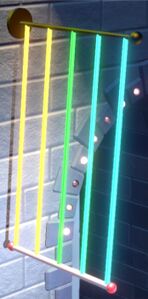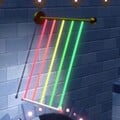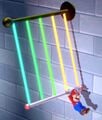Trapeze: Difference between revisions
Dongjun713 (talk | contribs) |
Nintendo101 (talk | contribs) (→Names in other languages: Additional names.) |
||
| Line 41: | Line 41: | ||
|Jap=ブランコ | |Jap=ブランコ | ||
|JapR=Buranko | |JapR=Buranko | ||
|JapM=Swing | |JapM=Swing | ||
|Fre=Balançoire | |Chi=鞦韆{{footnote|main|★}} | ||
|ChiR=Qiūqiān | |||
|ChiM=Swing | |||
|Dut=Trapeze{{footnote|main|★}} | |||
|DutM=Trapeze | |||
|Fre=Balançoire{{Ref needed}} | |||
|FreM=Swing | |FreM=Swing | ||
|Kor=그네 | |Fre2=Trapèze{{footnote|main|★}} | ||
|Fre2M=Trapeze | |||
|Kor=그네{{footnote|main|★}} | |||
|KorR=Geune | |KorR=Geune | ||
|KorM=Swing | |KorM=Swing | ||
|Por=Trapézio{{footnote|main|★}} | |||
|PorM=Trapeze | |||
|Spa=Trapecio{{footnote|main|★}} | |||
|SpaM=Trapeze | |||
}} | }} | ||
{{footnote|note|★|Compare with [[Tricky Trapeze Theater#Names in other languages|Tricky Trapeze Theater]].}} | |||
==References== | ==References== | ||
Revision as of 13:24, February 28, 2024
| Trapeze | |
|---|---|

| |
| First appearance | Super Mario Galaxy (2007) |
| Latest appearance | Super Mario 3D World + Bowser's Fury (2021) |
Trapezes are platforming objects that appear in Super Mario Galaxy, Super Mario Galaxy 2, Super Mario 3D World, and Super Mario 3D World + Bowser's Fury, where they are used to swing across pits, similar to ropes seen in past Super Mario titles. Characters can grab on to the horizontal bars and swing back and forth to gain momentum before jumping away.
History
Super Mario Galaxy / Super Mario Galaxy 2
 This section is a stub. You can help the Super Mario Wiki by expanding it.
This section is a stub. You can help the Super Mario Wiki by expanding it.
In Super Mario Galaxy, swings, referred to in Prima guides as trapezes,[1][2] have an appearance that is similar to vines. They can be used to swing Mario.
Swings return in Super Mario Galaxy 2 with the same purpose.
Super Mario 3D World / Super Mario 3D World + Bowser's Fury
In Super Mario 3D World and its Nintendo Switch port, trapezes are introduced in Tricky Trapeze Theater and later used in Rainbow Run, usually found alongside seesaws in the former or Turning Floors in the latter. Each trapeze consists of a long horizontal white bar hanging from a brass pole by five solid glowing beams. The colors of the beams constantly cycle between colors, creating a rainbow effect. Trapezes can be found in variable lengths. When they are not being used, they sway back and forth on their own at varying speeds.
If a character contacts one of the beams on a trapeze, they grab on to two of them and slide down to the bar, occupying one of the trapeze's four slots based on where they contacted it. They can also jump into the bar directly, which skips this animation. Trapezes' slots allow up to four players to simultaneously be on any one trapeze while being able to independently jump off it. When characters are on a trapeze, a short jingle will loop as the trapeze moves back and forth, and it can randomly change pitch after looping. Players can move in the direction that the trapeze is moving to make it move more in that direction, increasing its speed and momentum. Any player can jump to exit the trapeze, and their character's speed upon doing so corresponds to how fast the trapeze is moving.
Gallery
A swing in Super Mario Galaxy
A trapeze in Super Mario 3D World
Mario grabbing on to a trapeze in Super Mario 3D World + Bowser's Fury
Additional names
Internal names
| Game | File | Name | Meaning
|
|---|---|---|---|
| Super Mario Galaxy Super Mario Galaxy 2 Super Mario 3D World |
ObjectData/Trapeze.arc - content/ObjectData/Trapeze.szs |
Trapeze | - |
| Super Mario Galaxy Super Mario Galaxy 2 |
StageData/ObjNameTable.arc/ObjNameTable.tbl SystemData/ObjNameTable.arc/ObjNameTable.tbl |
空中ブランコ (Kūchū Buranko) | Sky Trapeze |
Names in other languages
| Language | Name | Meaning |
|---|---|---|
| Japanese | ブランコ Buranko |
Swing |
| Chinese | 鞦韆★ Qiūqiān |
Swing |
| Dutch | Trapeze★ |
Trapeze |
| French | Balançoire[citation needed] Trapèze★ |
Swing Trapeze |
| Korean | 그네★ Geune |
Swing |
| Portuguese | Trapézio★ |
Trapeze |
| Spanish | Trapecio★ |
Trapeze |
★ - Compare with Tricky Trapeze Theater.
References
- ^ Fletcher Black. Super Mario Galaxy: PRIMA Official Game Guide (Collector's Edition). Roseville: Prima Games, 2007. p. 62. ISBN: 978-0-76155-713-5.
- ^ Catherine Browne. Super Mario Galaxy 2: PRIMA Official Game Guide. Roseville: Random House Inc, 2010. pp. 101, 103, 170, 212, 213. ISBN: 978-0-30746-907-6.


